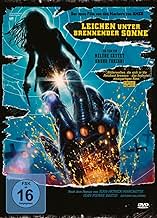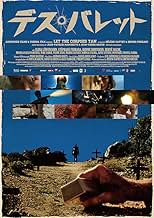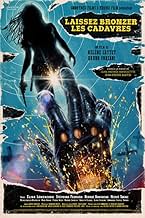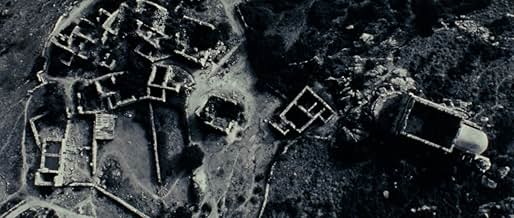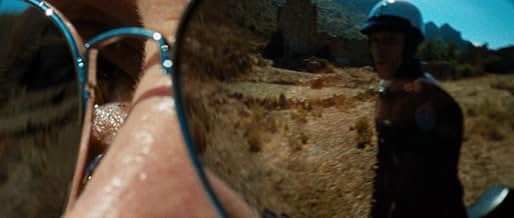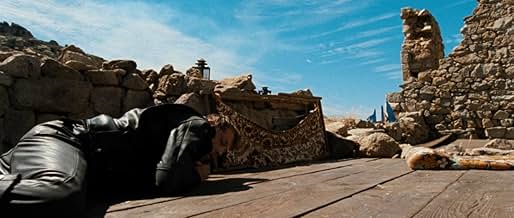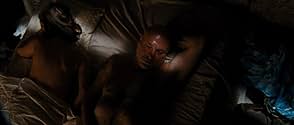VALUTAZIONE IMDb
6,2/10
3745
LA TUA VALUTAZIONE
Un delinquente e la sua banda si dirigono verso un'isola ritirata con un bottino di 250 chilogrammi di lingotti d'oro per abbassarsi; tuttavia, uno scrittore bohémien, la sua musa ispiratric... Leggi tuttoUn delinquente e la sua banda si dirigono verso un'isola ritirata con un bottino di 250 chilogrammi di lingotti d'oro per abbassarsi; tuttavia, uno scrittore bohémien, la sua musa ispiratrice, e un paio di gendarmi complicano le cose.Un delinquente e la sua banda si dirigono verso un'isola ritirata con un bottino di 250 chilogrammi di lingotti d'oro per abbassarsi; tuttavia, uno scrittore bohémien, la sua musa ispiratrice, e un paio di gendarmi complicano le cose.
- Regia
- Sceneggiatura
- Star
- Premi
- 4 vittorie e 9 candidature totali
Marilyn Jess
- La policière
- (as Dominique Troyes)
Recensioni in evidenza
Well, here's one issue we can discern right away: this film is blithely imitative. Nods or homages are one matter, but without a supple, delicate hand to guide the intention, any passing familiarity to other works or filmmakers is blunt and heavy-handed to the point of irritation. Not even ten minutes have passed and I see Ennio Morricone, Sergio Leone, Quentin Tarantino, David Fincher, Jay Rabinowitz, and more, recalled with a forcefulness that's distinctly off-putting. That forcefulness readily applies or extends to the direction, cinematography, editing, sound design, dialogue, acting, music, and effects, and arguably even to the production design, costume design, hair, and makeup. This isn't to say that 'Laissez bronzer les cadavres,' or 'Let the corpses tan,' can't still be enjoyable and worthwhile, but it's not an encouraging start, and the brusqueness, gawkiness, and flat-out aggressiveness of the project continues to be emphatically bothersome.
True, the filming locations are gorgeous. I do like the music selections themselves; would that the audio weren't so imbalanced, with the music egregiously high in the mix. Most bits and pieces here are just fine in and of themselves, in fact - or at least they are on paper, and would be in practice if they were approached with even the slightest sense of tact or nuance. Yet whether one wishes to attribute the tiresome zealousness of the presentation to filmmakers Hélène Cattet and Bruno Forzani alone, or also lay some responsibility on the shoulders of all other contributors, as we see it the picture is so impetuous and severe in its fundamental construction that it becomes taxing. By the time only one-third of the length has elapsed it feels like we've been watching for much longer. What it comes down to is this: there is earnest substance in 'Laissez bronzer les cadavres' as a violent thriller, but that substance is distinctly overwhelmed and almost entirely subsumed by the prioritization of Style, Style, Style. You've heard of "Location, Location, Location?" Well, here we are.
There's actually a lot to like here. Consider the root idea by itself, and we have a compelling, hard-charging action-crime flick on our hands, even if the discrete course of events is at most a tertiary concern. I recognize the skill and intelligence that shaped this feature, and that was poured into every component part. There are terrific ideas here, in pretty much every regard. I sharply disagree with the choices of how this was put together, however, including far too many embellishments that are supposed to lend flavor but which instead just come off as self-indulgent excess, especially in light of the general ethos behind the craftsmanship. I suppose it's also worth mentioning that the movie isn't very good at introducing or identifying characters, though in fairness this facet hardly matters; the violence, murder, and betrayal are clear enough without elucidation in the script of who is who, or where exactly their allegiances lie. More troubling is that some narrative elements go completely unexplained as they present; who is "the golden woman?" Beats me.
Factor in frenetic pacing in the direction and deliberately disjointed sequencing, and the unfortunate result is that the genuine value that 'Laissez bronzer les cadavres' has to offer is at best equaled and at worst far outweighed and dampened by Cattet and Forzani's extreme favor of flashy zest and flair over function, let alone mindfulness. There really is a lot that's done well here, but the sad truth is that the filmmakers' impulses needed to be significantly reined in, and the entertainment is not only reduced by the underlying slant but also specifically takes hits from those ways in which the presentation is heedlessly overdone. I assume that the novel this is based on is more lucid; I certainly hope so, at least, for the sake of Jean-Patrick Manchette and Jean-Pierre Bastid. One way or another, the fate of this 2017 picture is sealed. By all means, I'm glad for those who get more out of this and think it's a really great time, but I'm much less than fully convinced. For what it's worth, I look forward to checking out more from all involved, if only out of curiosity, yet 'Laissez bronzer les cadavres' itself is best reserved for a niche audience of which I am not part.
True, the filming locations are gorgeous. I do like the music selections themselves; would that the audio weren't so imbalanced, with the music egregiously high in the mix. Most bits and pieces here are just fine in and of themselves, in fact - or at least they are on paper, and would be in practice if they were approached with even the slightest sense of tact or nuance. Yet whether one wishes to attribute the tiresome zealousness of the presentation to filmmakers Hélène Cattet and Bruno Forzani alone, or also lay some responsibility on the shoulders of all other contributors, as we see it the picture is so impetuous and severe in its fundamental construction that it becomes taxing. By the time only one-third of the length has elapsed it feels like we've been watching for much longer. What it comes down to is this: there is earnest substance in 'Laissez bronzer les cadavres' as a violent thriller, but that substance is distinctly overwhelmed and almost entirely subsumed by the prioritization of Style, Style, Style. You've heard of "Location, Location, Location?" Well, here we are.
There's actually a lot to like here. Consider the root idea by itself, and we have a compelling, hard-charging action-crime flick on our hands, even if the discrete course of events is at most a tertiary concern. I recognize the skill and intelligence that shaped this feature, and that was poured into every component part. There are terrific ideas here, in pretty much every regard. I sharply disagree with the choices of how this was put together, however, including far too many embellishments that are supposed to lend flavor but which instead just come off as self-indulgent excess, especially in light of the general ethos behind the craftsmanship. I suppose it's also worth mentioning that the movie isn't very good at introducing or identifying characters, though in fairness this facet hardly matters; the violence, murder, and betrayal are clear enough without elucidation in the script of who is who, or where exactly their allegiances lie. More troubling is that some narrative elements go completely unexplained as they present; who is "the golden woman?" Beats me.
Factor in frenetic pacing in the direction and deliberately disjointed sequencing, and the unfortunate result is that the genuine value that 'Laissez bronzer les cadavres' has to offer is at best equaled and at worst far outweighed and dampened by Cattet and Forzani's extreme favor of flashy zest and flair over function, let alone mindfulness. There really is a lot that's done well here, but the sad truth is that the filmmakers' impulses needed to be significantly reined in, and the entertainment is not only reduced by the underlying slant but also specifically takes hits from those ways in which the presentation is heedlessly overdone. I assume that the novel this is based on is more lucid; I certainly hope so, at least, for the sake of Jean-Patrick Manchette and Jean-Pierre Bastid. One way or another, the fate of this 2017 picture is sealed. By all means, I'm glad for those who get more out of this and think it's a really great time, but I'm much less than fully convinced. For what it's worth, I look forward to checking out more from all involved, if only out of curiosity, yet 'Laissez bronzer les cadavres' itself is best reserved for a niche audience of which I am not part.
LET THE CORPSES TAN (LAISSEZ BRONZER LES CADAVRES!): A pretty good shootout thriller which is a bit messed up by philosophical and avant garde pretensions in fantasy sequences (some may be memories) and stilted dialogue. They don't quite negate the negation but might have negated the the film. Fortunately the action shots triumph over the postmodernist pisstakes to acheive a satisfactory synthesis.
An artist and a novelist are living in a series of ruins on a hilltop in the South of France, their lawyer arrives but has made a pact with a gang of Gold Bullion robbers to use the abode as a hideout. Meanwhile the author's wife arrives with her maid and a child (snatched) from a previous realtionship. Actually the robbers meet them by the hitching and give them a lift. Motorcycle cops investigating both the robbery and child abduction come to the ruins.
A many sided battle ensues with shifting allegiances taking place. This is very much a homage to/pastiche of the exploitation euro-Gangster films of the 1970's but is weakened by (imho) unnecessary psychedelic additions. The only effects I really appreciated was the effect of the Gold on the crooks, their faces tanned with avarice as they gazed on the bullion. Reminiscent of scenes from The Treasure Of The Sierra Madre. Some really savage and bloody scenes.
Directors Hélène Cattet and Bruno Forzani with the assistance of novelist Jean-Pierre Bastid on the screenplay would have delivered a pretty good thriller if they'd left out or toned down the biarrare elements. 6.5/10
An artist and a novelist are living in a series of ruins on a hilltop in the South of France, their lawyer arrives but has made a pact with a gang of Gold Bullion robbers to use the abode as a hideout. Meanwhile the author's wife arrives with her maid and a child (snatched) from a previous realtionship. Actually the robbers meet them by the hitching and give them a lift. Motorcycle cops investigating both the robbery and child abduction come to the ruins.
A many sided battle ensues with shifting allegiances taking place. This is very much a homage to/pastiche of the exploitation euro-Gangster films of the 1970's but is weakened by (imho) unnecessary psychedelic additions. The only effects I really appreciated was the effect of the Gold on the crooks, their faces tanned with avarice as they gazed on the bullion. Reminiscent of scenes from The Treasure Of The Sierra Madre. Some really savage and bloody scenes.
Directors Hélène Cattet and Bruno Forzani with the assistance of novelist Jean-Pierre Bastid on the screenplay would have delivered a pretty good thriller if they'd left out or toned down the biarrare elements. 6.5/10
All style, no substance. It's extremely hard to follow after the setup establishes the theft of gold bullion, with some of the worst storytelling and worst character development I've ever seen. We never learn anything about these people, and have little idea who's shooting who over most of the film; meanwhile the directors give us pointless cuts back in time which add nothing, and the film quickly descends into unexplained scenes of sex, violence, crucifixion, and urination. This dreamy/nightmarish style leads to interesting imagery at times and the scenery in the ruins overlooking the azure waters of Corsica is striking, but mostly the film is an exercise in wild surrealism and a mashup of old film references that was more frustrating than compelling, at least for me.
The people who are giving this really bad reviews must be knuckle draggers. This is a very unique and interesting flawed thriller. Flawed because is a little hard to follow with all the time jumps and inserted symbolism.
But if you stick with it you should be rewarded with a very interesting layered movie like you have not seen in a long long while.
It's a thinking man's (or woman's) movie. Pay attention.
But if you stick with it you should be rewarded with a very interesting layered movie like you have not seen in a long long while.
It's a thinking man's (or woman's) movie. Pay attention.
First, let me tell you that I highly liked the Jean Patrick Manchette's novel which this film is based on, and written and - or - produced by Doug headline - Manchette's son. That said, this film is faithful to the novel written back in 1971. At least if you consider the narrative ark, the basic scheme. This book from 1971 was a turn in the French crime novels history; it was one of the last French crime novels where it was question of gangsters, bank robbers and so on, which was a topic usually spoken about since the fifties and Auguste Le Breton, José Giovanni and so on...After this novel it was the beginning of the post May 68 era and the rise of the "subversive" crime novels, inspired by extreme left winged ideas and topics, stories highly against the establishment and political power. Manchette was the master in this field. He opened the road. Back to this film, it is faithful to the book BUT the aesthetic aspect is too much hysterical, totally crazy. NOT FOR ME. Most of the scenes are unexplained, absolutely senseless, you wonder where the screenplay drives at. This was unbearable for me. Sorry. I won't say that's a crap movie. No, but simply not for my taste. But I am aware that this feature is a big tribute to the sixties ear and the spaghetti western in particular. I won't even mention the Ennion Morricone like score. This movie seems most of the time boring. I nearly fell asleep at some times. I deserves although to be seen. The armored truck heist sequence is also a tribute, but to Jean Pierre Melville's masterpiece THE SECOND BREATHE, in the heist attack scene, on the lost sea side mountain road.
This movie is like a pasta dish, with or without red pepper. It could have been told in a raw way, without all those artifices. But maybe some audiences could have found this tasteless. So they used this camera eccentricities.
See for yourself.
This movie is like a pasta dish, with or without red pepper. It could have been told in a raw way, without all those artifices. But maybe some audiences could have found this tasteless. So they used this camera eccentricities.
See for yourself.
Lo sapevi?
- QuizDario Argento's Deep Red (1975) famous soundtrack is used.
- ConnessioniReferences Faccia a faccia (1967)
I più visti
Accedi per valutare e creare un elenco di titoli salvati per ottenere consigli personalizzati
- How long is Let the Corpses Tan?Powered by Alexa
Dettagli
Botteghino
- Lordo Stati Uniti e Canada
- 93.409 USD
- Fine settimana di apertura Stati Uniti e Canada
- 11.918 USD
- 2 set 2018
- Lordo in tutto il mondo
- 93.409 USD
- Tempo di esecuzione1 ora 32 minuti
- Colore
- Proporzioni
- 2.35 : 1
Contribuisci a questa pagina
Suggerisci una modifica o aggiungi i contenuti mancanti




